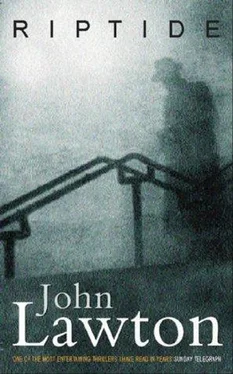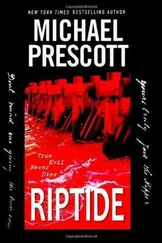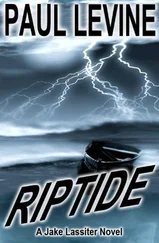He spread his fingers that bit the more-it hurt.
Late in the afternoon Bruhns returned with a silver tray, draped delicately with a large linen napkin. He set it down on Heydrich’s desk. Heydrich was staring out of the window. Bruhns whipped away the napkin. Whoever it was had done a neat job, a piece of surgery worthy of Baron Frankenstein. All the same Bruhns pulled a face behind Heydrich’s back, wincing more at the gruesome notion of hands on a platter than at the sight itself. It inevitably put him in mind of John the Baptist-but the silver tray was all he could find to put them on. It was the tray he used for the Obergruppenfuhrer’s morning coffee. The pathologist had sent the hands over wrapped in brown paper like two bits of haddock fresh from the fishmonger’s slab. Heydrich was a stickler for neatness-you didn’t serve up anything to such a fastidious man on a bloody sheet of wrapping paper.
‘Got ‘em,’ he said simply.
Heydrich turned. One glance at the hands and then straight into Bruhns’ eyes.
‘What are you waiting for?’
‘Nothing sir.’
‘Then get out.’
Heydrich waited for the door to close. The left hand was broken, the fingers splayed at unnatural angles, the flesh black and blue. He spread the right, free of rigor, as wide as it would go. Then he laid his own hand across it. Cold. Softer than one would imagine. Dead meat. Nothing more than dead meat. Like picking up a pig’s trotter at the butcher’s. His own spread by far the wider. He knew his capacity at a keyboard-a slightly better than average span at an octave and two. This man scarcely touched an octave. It was a fat stubby hand. Heydrich had watched Stahl’s hands glide across a keyboard countless times. His span was an octave and four. There was no piece in the repertory of the piano the man could not play for want of the span of a hand. These were not the hands of Wolfgang Stahl. Stahl was alive. Alive and with a forty-eight-hour start on him.
‘Bruhns!’
Bruhns appeared at the door, blankly expressionless.
‘Call the Chancellery. Get me an appointment with the Fuhrer. And arrange a funeral for Brigadefuhrer Stahl.’
‘Private, sir? Family and friends?’
‘What family? Stahl had no family. No man, public. Large, lavish and public. We are burying a hero.’
Ten days later Bruhns found himself flipping the lid on a couple of steins of wheat beer with his old pal Willi. He and Willi went back to the twenties together-to their schooldays. They’d hated their teachers then. Now they hated their officers and met every so often to drink beer-wheat beer was great for inducing that delicious, deliriously sodden feeling; a nice heavy, cloudy brew, heavier still since the Reich had seen fit to boost public morale by raising the alcohol level of beer to ten per cent-and to moan about their bosses. Willi was in the Abwehr, a corporal in Military Intelligence-it was something to write home about, but Bruhns’ job was the more interesting. Not everybody got to work for a flash bastard like Heydrich. At best Willi got to pass Admiral Canaris in a corridor-he’d never even spoken to the man. And not everybody got the afternoon off to go to a top-notch Nazi funeral. All that goose stepping and dreary music, but it had to be better than working. Another thing he and Willi had in common, they’d both volunteered to avoid the draft. Get their pick of regiments. Bruhns had even joined the party for appearances’ sake-the trouble he’d had learning the Horst Wessel song! Didn’t make either of them into loyal Nazis-as far as Bruhns was concerned they were just two blokes trying to get by, occasionally get laid, and more often get rat-arsed. His old man had been a paid-up Commie, but he had no politics one way or the other. Nothing against the Jews-well not much, anyway-and for all he cared they could bring back the Kaiser-silly little prick with his wonky arm and daft hats. He should care.
‘You get to see the body then, Gunther?’
Bruhns was puzzled, but too pissed to want to argue-daft question all the same.
‘Nah. Mind, I saw his hands though.’
‘Mis hands?’
‘The boss had ‘em cut off.’
‘Cut off? Why?’
‘Search me. One minute he’s quizzing me about tattoos and things-wants to know if that body was Wolfie Stahl-next thing he’s damn certain it is and rushes off to tell old ‘Dolf’
‘Keep your voice down! Do you want us both to end up in a camp?’
‘Wossitmatter? Nobody’s listening.’
‘Gunther-this is Germany. Everybody’s listening. It isn’t just walls have ears-the floor, the ceiling, the doorknob and the garden shed have ears.’
‘Well if they’re listening, let ‘em ‘ear this. If that body was Wolfie Stahl, then my name’s Fatso Goering! Now it’s your round. Get ‘em in.’
Calvin M. Cormack III sat in his Zurich office, breathed on his glasses, wiped them on his handkerchief and hooked the wire ends over his ears. The M in Calvin M. Cormack III was something Calvin M. Cormack III would have preferred to forget entirely. The M in Calvin M. Cormack Sr and in Calvin M. Cormack Jr (his grandfather and father respectively) stood for Michael. The M in Calvin M. Cormack III stood for Manassas, the battle of the Civil War in which his grandfather had lost an arm, almost eighty years ago. The old man-still going at ninety-seven-always called it ‘the war’ (pronounced ‘wawer’), thereby ignoring the Spanish-American War, the World War and eighteen months of what the British were already calling World War II regardless of its global imprecision. He had served under General Jackson in Virginia, and had worn the arm, or rather the absence of an arm, more proudly than any medal. General Jackson had emerged from the battle with the nickname ‘Stonewall’; 2 ndLieutenant Cormack had been less lucky: ‘Catch’-as in ‘One-handed ‘Catch’-Cormack. A one-armed hero, but a hero all the same. Years later, nearer the turn of the century, when he had been elected Senator for Virginia, he had been cheered into the Senate like a returning warrior-and he played the part to the hilt in a white linen suit, a frock coat, the empty sleeve pinned to the side, his frame spare to the skeletal, a shock of white hair combed back from his forehead, looking like the caricature of a circuit judge in some long-forgotten Twain story. A Southerner from tip to toe.
‘It’s crap,’ said Cal’s father. ‘He filled me up with all that rebel stuff when I was a boy. I love the old guy-and so should you-but take everything he says with a pinch of salt. All he wants to do is put back the clock. Can’t be done. We’re one nation. Don’t ever forget it.’
‘But why the name? Why Manassas?’ Cal had protested at about age twelve.
‘You’re a Southerner. Don’t ever forget it.’
It was years before this struck Cal as anything other than a paradox, and paradox was not a word he knew at the age of twelve. His father had served the Democrat party machine in Virginia, but he’d also served it in Pennsylvania and New York. It had been convenient to send Cal to school in upstate New York. On the first clay they had called the roll in full, and when they got to Cal the hoys had sniggered at Manassas. The kid next to him had said, ‘Manassas? What kind of a name is that?’
‘Bull Run’ Cal had whispered back. ‘It means Bull Run, that’s all. That’s what it was called by the South.’
‘Bull Run? Who in hell’d name a kid Bull Run?’
And so it had gone on. Five years or more. Manassas quickly became Molasses-he was stuck with it. ‘Molasses, molasses, skinny kid in glasses!’
When Cal was fourteen his father won a congressional seat in his home state-and he’d done it by declaring his independence of the Senior Senator for Virginia-on everything from the Silver Standard to the Pershing Expeditionary Force. Calvin M. Cormack Jr was nobody’s boy. No one, to his face, ever called him son of Catch, or dared to air the notion that he was riding the political high road clutching onto his father’s frock coat. To his own son he said, ‘I had to do it. I couldn’t live that plantation-owner gimcrack. There’s not a Cormack so much as plucked a boll, let alone jumped down, turned around and picked a bale. I appeased the old man with your name. Let him know I’d never betray the South-whatever else I did. Freed us to get on with being Americans the rest of the time.’
Читать дальше












